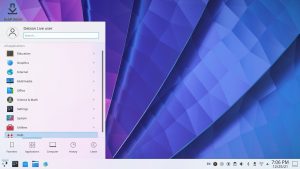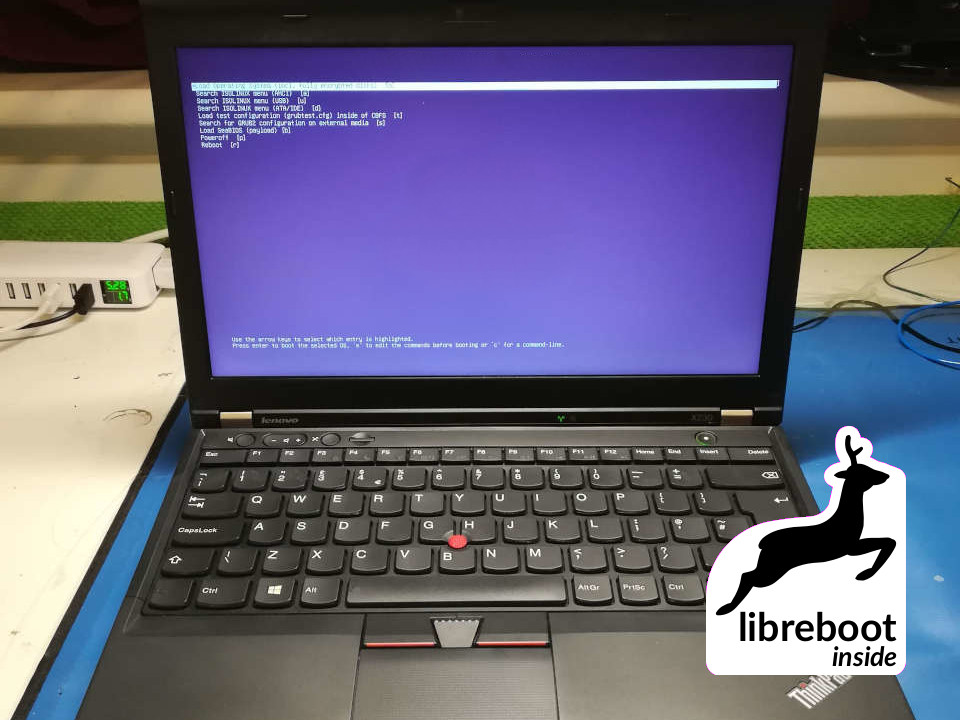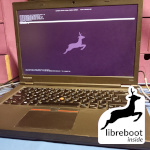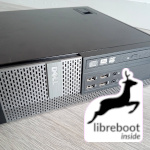Description
This is a highly compact, portable laptop based on modification of the Lenovo ThinkPad X230, running free/opensource BIOS replacement Libreboot plus Debian Linux (operating system), other Linux distro or a BSD of your choice (e.g. OpenBSD, FreeBSD). Full driver support in Linux and BSD operating systems, including WiFi. The benefit of Libreboot is that since it’s a free/opensource project, releases can be audited so you have a greater assurance that there are no firmware-based backdoors in your system. The Intel ME is *disabled*, using me_cleaner. Libreboot has other benefits such as faster boot speeds and greater customisation, and advanced security features you can’t get anywhere else, such as the easy ability to boot LUKS2-encrypted systems directly, even if /boot is encrypted. Leah Rowe, who founded the Libreboot project in 2013, runs the project to this day and also owns Minifree; sales fund the project. These machines are provided because we believe Free Software is a *right* that everyone must have.
Shipping worldwide! Running free/opensource software! The correct power cable is provided, for each customer; the power supply is 120-240V auto-switching, so it works in every country. Libreboot is a free/open source BIOS/UEFI replacement, providing boot firmware that initialises the hardware in your computer, to then load an operating system (e.g. Linux/BSD). It provides many additional benefits such as fast boot speeds, greater security and greater customisation, but the *primary* benefit is software freedom. You can rest easy knowing that Libreboot will never knowingly contain backdoors, and will never spy on you; the same cannot be said for many proprietary products out there. All of the source code is provided in each Libreboot release, which can be fully audited. Debian Linux preinstalled. Another distro or a BSD (e.g. OpenBSD, FreeBSD, NetBSD) can be preinstalled, on your request, at no additional cost. These machines are intended for security-conscious people who value the ideals of the free software movement, and want something easy to use.
All Minifree sales directly fund Libreboot development; Libreboot’s founder and lead developer, Leah Rowe, is also the owner of Minifree Ltd. I work on Libreboot every day, and I work with a lot of other people.
Your freedom. Your Libreboot.
Most people use proprietary boot firmware, even if they use free operating systems. Many computers today are known to contain malware, chief among them being Intel’s Management Engine (ME). Our systems are different. Your Libreboot system will *never* spy on you, and it will never leak your data to anyone. Your privacy and security is critical. You are the owner of your machine. We believe free software is a fundamental right, something that everyone *must* have.
Your Libreboot X230 obeys you, and nobody else! It’s Libreboot inside! The Intel ME is *disabled* on every machine, using me_cleaner which disables the ME after BringUp – this is done for your security, and privacy. You have the freedom to tinker with every part of the machine; full source code is also available, for Libreboot and the installed Linux/BSD operating system of your choice.
Your purchase will directly provide funding for further Libreboot development. Minifree directly funds the Libreboot project; it feeds me so that I can continue working on it, and I use the profits to buy a *lot* of hardware for testing, in addition to the money required to maintain all of the infrastructure of the project. I am Libreboot’s BDFL and have been for years. I don’t have millions of £ like the big vendors, but I plan conservatively and spend wisely, and I work on Libreboot every day, and I work with plenty of other people who collaborate with the project both directly and indirectly.
Debian Linux is secure, easy to use
 *Encrypted* Debian GNU+Linux is pre-installed to keep your data secure, with *full* driver support including WiFi. Other distros or a BSD (e.g. OpenBSD, FreeBSD) can be preinstall on your request, for no additional cost. Libreboot is a Free Software project, which replaces proprietary BIOS/UEFI firmware. These sales are conducted to fund development of Libreboot, lead by Leah Rowe who is Libreboot’s founder and lead developer, and the director of Minifree Ltd.
*Encrypted* Debian GNU+Linux is pre-installed to keep your data secure, with *full* driver support including WiFi. Other distros or a BSD (e.g. OpenBSD, FreeBSD) can be preinstall on your request, for no additional cost. Libreboot is a Free Software project, which replaces proprietary BIOS/UEFI firmware. These sales are conducted to fund development of Libreboot, lead by Leah Rowe who is Libreboot’s founder and lead developer, and the director of Minifree Ltd.
By default, Minifree ships with *encrypted* Debian (KDE Plasma desktop environment).
Debian is a solid, robust OS with a strong security team and release engineering team behind it. It’s the bedrock of the Linux world, upon which many distros are built. It has a proven track record of reliability, and it’s easy to use for most new people while being extremely flexible for advanced users. It’s an all-round good default choice, which is why Minifree ships it.
More info about Debian can be found here: https://www.debian.org/
Qubes is also compatible; please request this specifically, in the textbox on the checkout page, if you want Qubes preinstalled.
WiFi whitelist disabled!
Vendor firmware typically restricts what WiFi cards you can use, among other restrictions.
We believe that you should have the choice over what upgrades you install yourself, in your own machine – it’s your property!
Libreboot is preinstalled, replacing the proprietary vendor firmware, and Libreboot does *not* contain any such restrictions. You can use the machine however you like. The included Intel WiFi is pretty high-performance and should satisfy most people, but you have the freedom to switch it if you wish. This can be done easily, and further instructions can be provided to you on request.
Intel ME disabled!
The Intel Management Engine is entirely *disabled*, using me_cleaner. See: https://github.com/corna/me_cleaner/wiki/How-does-it-work%3F
Why use *these* machines?
Many people nowadays use bloated, inefficient software, a description that often applies to proprietary software; Free Software isn’t beholden to corporate greed, and many of the people who work on it care passionately about writing the most well-audited, high quality code. Modern versions of Windows use *gigabytes* of RAM, whereas a Linux/BSD system with a lightweight (yet modern) desktop environment will use far less than that, aswell as few CPU cycles and disk I/O; in other words, Linux systems can have much lower system requirements. Minifree shares in this *lightweight* software design philosophy. Libreboot itself (lead by the same person who owns Minifree) is designed to be as simple as possible, in terms of project infrastructure, build system, and actual coreboot configuration, providing firmware that boots as quickly as possible, and with a simple user interface (SeaBIOS and/or GRUB payload) that most people can just use, intuitively. Libreboot *heavily* patches the various upstream projects used, such as coreboot and GNU GRUB, fixing various upstream issues and providing more reliable operation for the user.
Libreboot releases focus on stability, providing well-tested firmware that is rock-solid on all of the supported hardware, and with a unified user interface across (where possible) all boards. That means, if you learn to use one Libreboot system, you can most likely use another with little fuss. Libreboot does away with nasty anti-features such as UEFI SecureBoot (nasty because it makes using free operating systems harder), instead implementing its own optional security methods that are completely within the user’s control, such as GPG signature checking of your Linux kernel from GRUB, which runs directly in the flash (which you can write-protect, if you wish), or the ability to have *true* Full Disk Encryption, including /boot. In *most* setups (on x86 hardware), Libreboot directly boots GNU GRUB from the flash (with its own config file), which is configured to automatically find and boot your distro’s own GRUB, EXTLINUX or SYSLINUX configuration (and manual configuration is possible), even in cases where it resides in an EFI System Partition (ESP), or a btrfs sub volume – GRUB is extremely powerful in this setup, as a *coreboot payload*, more flexible than any standard BIOS- or UEFI-based setup, and it works because Linux/BSD systems are able to run directly on bare metal, without calling into BIOS/UEFI. Libreboot provides a direct video framebuffer, that any operating system can use if it supports Kernel Mode Setting (all Linux/BSD systems do nowadays). This is a much cleaner way to boot your operating system, and GRUB is highly efficient.
A coreboot payload called *SeaBIOS* is also provided, which you can optionally use (useful for BSD bootloaders, prior to loading the BSD kernels). SeaBIOS implements a standard x86 PC BIOS, whereas GRUB provides *multiboot* functionality to directly boot a Linux kernel (along with drivers for the disk, filesystem, etc – and an often overlooked but extremely powerful user shell, that behaves very similarly to a full BASH shell with many commands available – more info available in the GRUB documentation, though Minifree configures these systems to Just Work so you can simply turn them on and use them).
Libreboot *even* includes MemTest86+ directly in the flash! You can boot it from the GRUB or SeaBIOS payload. No more messing about with bootable USB media. It comes preinstalled! Coreboot is very different than proprietary firmware, in that you can run whatever you want. You’re not restricted to whatever the vendor gives you. You could *even* compile your own OS (e.g. Linux with busybox/musl) and put it in the flash, if you wanted to, and run whatever applications you want, without ever touching your SSD; chainload it from the GRUB payload, or reconfigure coreboot to load Linux directly (from flash).
Jargon aside, one thing that many people will ask is: does Libreboot work with standard Linux/BSD systems, without modification? The answer is yes. Minifree uses *standard* Linux/BSD installer images, provided by the respective upstreams (e.g. Debian, Archlinux, FreeBSD). You can use your Libreboot machine more or less just as you would a typical BIOS/UEFI system; Windows is also compatible, though we recommend that you stick to Linux/BSD, for your freedom. More information is available on the Libreboot documentation.
These are the same machines used for Libreboot development. Leah Rowe, the founder and lead developer of Libreboot, also runs Minifree. Sales fund the project, and these machines are *used* by Leah day to day for all tasks. Many people are surprised when they turn on a Libreboot machine, and it gets to the bootloader (e.g. GRUB) in a few seconds or less, booting faster than even a brand new (non-Libreboot) machine. This is the power of Libreboot, and free software in general, in allowing the hardware to run *much* more efficiently.
Put simply: we want to live in a world where everyone can easily and comfortably use *free software*, liberated from the shackles of proprietary software. We want to live in a world where your property is *your* property; extended to computing, this makes free software a fundamental right that *everyone* *must* have.
Information about the product
Included accessories
- Battery included, fully tested
- AC-DC adapter (charger) included (100-240V auto-switching, works in all countries)
- UK, EU or US power cable included, depending on country.
Laptop specifications:
- Intel Core i5-3320M (2.60 GHz, 3MB L3, 1600MHz FSB)
- Graphics: Intel HD Graphics 4000
- Screen: 12.5″ 1366×768 TFT LCD
- Gigabit ethernet as standard
- Ports: 1x Mini DisplayPort, 1x VGA, 2x USB 2.0, 2x USB 3.0, 1x Headphone, 1x Microphone, 1x Gigabit Ethernet and more
- Backlight (brightness) control is fully functional in Libreboot on this laptop
- Battery: 6 cell. In either case, we guarantee at least 45Wh capacity per battery (you can request higher capacity, and then we will make sure to get you the best, e.g. 99Wh or whatever is feasible. These batteries aren’t made new anymore, so new batteries are 3rd party ones not made by Lenovo. 3rd party batteries work well, but capacities vary per supplier).
- WiFi: Intel Corporation Centrino Advanced-N 6205
- More specifications shown here: https://www.thinkwiki.org/wiki/Category:X230
When new Libreboot versions are released, it is possible to update to those newer versions using software (no disassembling required). Full instructions are provided.





